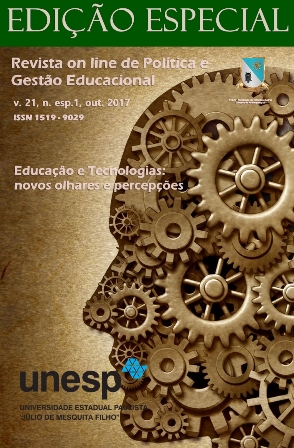TECHNOLOGY AND INTELLECTUAL DISABILITY: PEDAGOGICAL PRACTICES FOR DIGITAL INCLUSION
DOI:
https://doi.org/10.22633/rpge.v21.n.esp1.out.2017.10449Keywords:
Special education. Intellectual disability. Technology. Digital inclusion.Abstract
The educational service for students with intellectual disability is a recurrent theme in the discussions of this field, in the sense of overcoming an excluding vision that considers the disability and ignores the capabilities, and searching to offer real conditions of access to knowledge coming from specificities. The use of technology has been pointed out as a pedagogical resource that can contribute in this process, making the student the protagonist, allowing the development of a number of areas of knowledge. Thus we have developed a study from an extension project linked to Unesp Teaching Center (Núcleo de Ensino da Unesp), aiming to propose and evaluate pedagogical actions through the use of computing for students with intellectual disability. The study was performed at a Special Education Center with a group of 18 students with ages between 9 and 60 years. It was based on the theoretical references of historical-critical pedagogy and historical-cultural psychology. It also used a qualitative approach and had research-action as its methodological procedure. The results obtained from evaluations, regular teachers’ reports and procedural follow-up of the participants demonstrated that the students involved were placed in digital information environments and the computer has acted as an effective pedagogical tool in the process of teaching and learning.Downloads
References
BITTENCOURT, P. A. S.; ALBINO, J. P. O uso das tecnologias digitais na educação do século XXI. Revista Ibero-Americana de Estudos em Educação. Araraquara, v. 12, n. 1, p. 205-214, jan-mar/2017.
CARNEIRO, R. U. C.; SILVA, S. S. Inclusão escolar de alunos público alvo da educação especial: como se dá o trabalho pedagógico do professor no ensino fundamental I? Revista Ibero-Americana de Estudos em Educação. Araraquara, v. 11, n. esp. 2, p. 935-955, 2016.
CUNHA, M. D.; BIZELLI, J.L. Caminhos para TIC em sala de aula sob a perspectiva dos professores. Revista on line Política e Gestão Educacional. Araraquara, v.20, n.2, p.282-300, maio-ago/2016.
ENGEL, T. G.; SILVEIRA, D. T. (Org.). Métodos de Pesquisa. 1ª Ed. Rio Grande do Sul: Editora da UFRGS, 2009.
FERNANDES, A. P. C. S. A escolarização de alunos da EJA em turma especial em tempo de política de educação inclusiva. Revista on line Política e Gestão Educacional. Araraquara, n. 15, p. 228-234, 2013.
FETTBACK, C. S.; BALDIN, N. O contexto da educação especial na perspectiva da educação inclusiva: as vozes dos professores e dos familiares na rede municipal de ensino de Joinville (SC). Revista on line Política e Gestão Educacional. Araraquara, n.17, p.167-186, 2014.
JUNIOR, W. A.; KISHIMOTO, T. M. Jogos digitais, mediação e a psicologia histórico-cultural. In: IX Amostra de Pesquisas em Educação. Anais da IX Amostra de Pesquisas em Educação. Araraquara: UNESP, 2015.
LÜDKE, M.; ANDRÉ, M. E. D. A. Pesquisa em educação: abordagens qualitativas. São Paulo: EPU, 1986.
OLIVEIRA, V. A.; MOREIRA, H. As tecnologias da informação e comunicação como mediação pedagógica no curso de pedagogia. Revista Ibero-Americana de Estudos em Educação. Araraquara, v. 10, n. 2, p. 371-389, 2015.
SEVERINO, A. J. Metodologia do trabalho científico. 23 ed. São Paulo: Cortez, 2007.
THIOLLENT, M. Metodologia da pesquisa-ação. 18 ed. São Paulo: Cortez, 2011.












